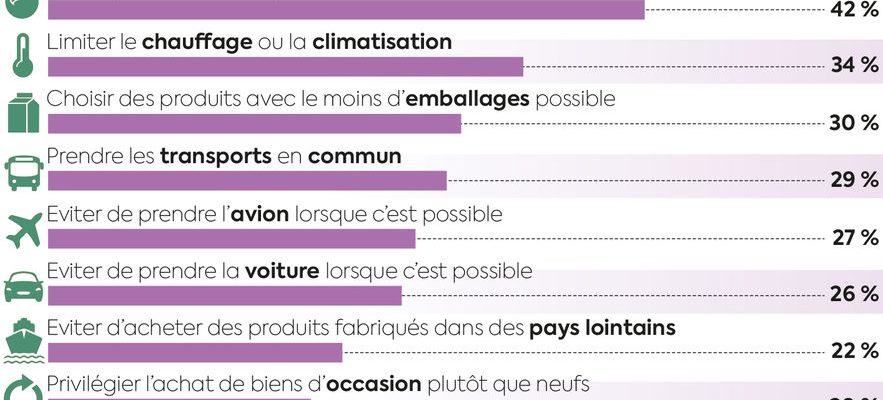After a year 2022 marked by numerous weather anomalies, opinion pollsters were expecting a few surprises. But certainly not to such great… apathy. According to the latest Obs’COP barometer carried out by EDF and Ipsos from a sample of 24,000 people in 30 countries, eco-gestures are progressing laboriously. The people most likely to put them into practice are seeing their numbers decline in some parts of the world. The new generations, although more sensitive to the climate issue, do not really seem to be giving up the way of life of their elders. Worse, they now risk being influenced by the spectacular rise of climate skepticism on social networks.
“Ultimately, nothing is going as planned, observes Didier Witkowski, Director of Studies at EDF. Admittedly, we have reached a kind of plateau. The environment is now a background concern. gives way to other daily concerns such as inflation.” The evolution of the “climate change public” (PCC), this part of the population convinced of the anthropogenic causes of global warming and the need to act collectively, sums up the current difficulty well. This group still represents only 28% of the world’s population. “Some past work tells us that more than 60% of citizens accept the idea of anthropogenic climate change. But with the notion of PCC, we have a more rigorous and realistic version of the state of the forces. France, we are even closer to 20% than a third of the population”, explains Mathieu Brugidou, political scientist and senior researcher at EDF R & D.
This relatively low proportion, which is even decreasing in some Asian countries, no doubt explains the weak increase in eco-gestures. The most common are waste sorting (48%) and preference given to seasonal fruits and vegetables (42%). Next come (less than a third of respondents), the limitation of heating or air conditioning, or attention to the over-packaging of products. But the lesser use of the car, the plane as well as the reduction in the consumption of meat – however effective from the point of view of CO2 emissions – collect little support. Including among the greenest.
Thus, 21% of PCCs use the plane three or more times during the year, compared to 17% of non-PCCs. Similarly, 71% of CCPs use the car several times a week compared to 70% of non-CCPs. It is only on the consumption of meat that the most virtuous stand out. “We are faced with a contradiction: the groups of individuals most aware of the problem and most committed to solving it are also those who have the most harmful practices”, observes Mathieu Brugidou.
3746_CLIMAT_Ecogeste_2
© / Art Press
“We are not going to race in BlaBlaCar”
“It is illusory to think that we are going to advance the transition by the will of people alone, believes Didier Witkowski. Not only do they remain limited by their income but also by what they are offered in terms of consumption or infrastructure. Thus the use of the car remains closely linked to the size of the municipality.” “If you live in Paris, taking your vehicle to work seems like a bad idea. On the other hand, when you live in a small town and you also have to bring the children to school, it makes sense. In some cases, reducing the use of the car is structurally impossible. We do not go shopping in BlaBlaCar”, specifies Daniel Boy, director of research emeritus at the Center for the study of French political life (Sciences Po).
Being young doesn’t change anything. “In Europe and the United States (but not in the rest of the world), this part of the population is much more aware of the existence and the anthropogenic character of climate change, explains Daniel Boy. However, within the home, young people do not bear the cost of energy. They do not make food purchases. They cannot finance the acquisition of a car and do not choose the method of heating the house either.” Difficult for them to weigh in these conditions.
In general, the countries of the North remain the most reluctant to make things happen, especially in transport. Thus, the nations at the forefront of climate mobilization are the least accepting of urban tolls, limiting the circulation of polluting vehicles, etc. “No doubt their citizens know that the measures will really be put in place, unlike what is happening in certain countries of the South where the regulation is softer”, advances Emiliano Grossman, professor of political science at Sciences Po.
“As long as we remain at the level of the principle of the energy transition, we observe a very high rate of acceptance within the population. But from the moment when we discuss the concrete solutions to be put in place and therefore the impacts on the population, resistance appears. Especially since citizens are not all affected in the same way”, adds Jérémy Bouillet, doctor in political science and researcher at EDF R & D.
“In the future, these tensions will increase further,” predicts Mathieu Brugidou. But the researcher still sees a positive element. “There is a debate in society. We are making progress in the terms of application. We are beginning to wonder about possible compensation. This is also how we can respond to the wishes of the population, very sensitive to the idea that the efforts are shared by all.”
